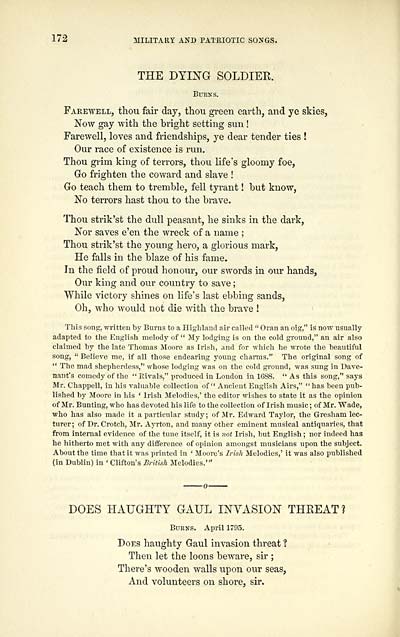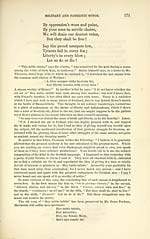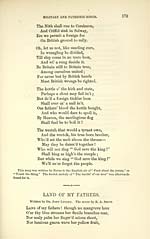Glen Collection of printed music > Printed text > Illustrated book of Scottish songs from the sixteenth to the nineteenth century
(188) Page 172 - Dying soldier
Download files
Complete book:
Individual page:
Thumbnail gallery: Grid view | List view

172 MILITARY AND PATUIOTIC SONGS.
THE DYING SOLDIER.
Burns.
Farewell, thou fair day, thou green earth, and ye skies,
Now gay with the bright setting sun !
Farewell, loves and friendships, ye dear tender ties !
Our race of existence is run.
Thou grim king of terrors, thou life's gloomy foe.
Go frighten the coward and slave !
Go teach them to tremble, fell tyrant ! but know,
No terrors hast thou to the brave.
Thou strik'st the dull peasant, he sinks in the dark,
Nor saves e'en the wreck of a name ;
Thou strik'st the young hero, a glorious mark,
He falls in the blaze of his fame.
In the field of proud honour, our swords in our hands.
Our king and our country to save ;
While victory shines on life's last ebbing sands.
Oh, who would not die with the brave !
This song, written by Burns to a Highland air called " Oran an oig," is now usually-
adapted to the English melody of " My lodging is on the cold ground," an air also
claimed by the late Thomas Moore as Irish, and for which he wrote the beautiful
song, " Believe me, if all those endearing young chamis." The original song of
" The mad shepherdess," whose lodging was on the cold ground, was sung in Dave-
nant's comedy of the " Rivals," produced in London in 1688. " As this song," says
Mr. Chappell, in his valuable collection of" Ancient English Airs," "has been pub-
lished by Moore in his ' Irish Melodies,' the editor wishes to state it as the opinion
of Mr. Bunting, who has devoted his life to the collection of Irish music ; of Mr. Wade,
who has also made it a particular study ; of Mr. Edward Taylor, the Gresham lec-
turer; of Dr. Crotch, Mr. Ayrton, and many other eminent musical antiquaries, that
from internal evidence of the tune itself, it is not Irish, but English ; nor indeed has
he hitherto met with any difference of opinion amongst musicians upon the subject.
About the time that it was printed in ' Moore's Irish Melodies,' it was also published
(in Dublin) in ' Clifton's British Melodies.'"
DOES HAUGHTY GAUL mVASION" THREAT?
Burns. April 1795.
Does haughty Gaul invasion threat ?
Then let the loons beware, sir ;
There's wooden walls upon our seas,
And volunteers on shore, sir.
THE DYING SOLDIER.
Burns.
Farewell, thou fair day, thou green earth, and ye skies,
Now gay with the bright setting sun !
Farewell, loves and friendships, ye dear tender ties !
Our race of existence is run.
Thou grim king of terrors, thou life's gloomy foe.
Go frighten the coward and slave !
Go teach them to tremble, fell tyrant ! but know,
No terrors hast thou to the brave.
Thou strik'st the dull peasant, he sinks in the dark,
Nor saves e'en the wreck of a name ;
Thou strik'st the young hero, a glorious mark,
He falls in the blaze of his fame.
In the field of proud honour, our swords in our hands.
Our king and our country to save ;
While victory shines on life's last ebbing sands.
Oh, who would not die with the brave !
This song, written by Burns to a Highland air called " Oran an oig," is now usually-
adapted to the English melody of " My lodging is on the cold ground," an air also
claimed by the late Thomas Moore as Irish, and for which he wrote the beautiful
song, " Believe me, if all those endearing young chamis." The original song of
" The mad shepherdess," whose lodging was on the cold ground, was sung in Dave-
nant's comedy of the " Rivals," produced in London in 1688. " As this song," says
Mr. Chappell, in his valuable collection of" Ancient English Airs," "has been pub-
lished by Moore in his ' Irish Melodies,' the editor wishes to state it as the opinion
of Mr. Bunting, who has devoted his life to the collection of Irish music ; of Mr. Wade,
who has also made it a particular study ; of Mr. Edward Taylor, the Gresham lec-
turer; of Dr. Crotch, Mr. Ayrton, and many other eminent musical antiquaries, that
from internal evidence of the tune itself, it is not Irish, but English ; nor indeed has
he hitherto met with any difference of opinion amongst musicians upon the subject.
About the time that it was printed in ' Moore's Irish Melodies,' it was also published
(in Dublin) in ' Clifton's British Melodies.'"
DOES HAUGHTY GAUL mVASION" THREAT?
Burns. April 1795.
Does haughty Gaul invasion threat ?
Then let the loons beware, sir ;
There's wooden walls upon our seas,
And volunteers on shore, sir.
Set display mode to: Large image | Transcription
Images and transcriptions on this page, including medium image downloads, may be used under the Creative Commons Attribution 4.0 International Licence unless otherwise stated. ![]()
| Special collections of printed music > Glen Collection of printed music > Printed text > Illustrated book of Scottish songs from the sixteenth to the nineteenth century > (188) Page 172 - Dying soldier |
|---|
| Permanent URL | https://digital.nls.uk/90350839 |
|---|
| Description | Scottish songs and music of the 18th and early 19th centuries, including music for the Highland bagpipe. These are selected items from the collection of John Glen (1833 to 1904). Also includes a few manuscripts, some treatises, and other books on the subject. |
|---|
| Description | The Glen Collection and the Inglis Collection represent mainly 18th and 19th century Scottish music, including Scottish songs. The collections of Berlioz and Verdi collected by bibliographer Cecil Hopkinson contain contemporary and later editions of the works of the two composers Berlioz and Verdi. |
|---|

